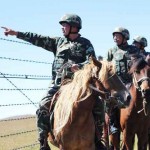The Russian Threat : The element which was to play a major role in Britain’s foreign policy toward Tibet and thereby decide the fate of Tibet as a nation, is what has been called the ‘Russian threat’.
One of the origins of this myth — or reality — was an information passed by a Japanese monk called Ekai Kawaguchi to Sarat Chandra Das, the most famous of the Indian Pundits,13 who was spying for the British Government.
Click to buy: Tibet: The Lost Frontier
He reported that a caravan of 200 camels had arrived in Lhasa from the North east. The camels were said to be carrying boxes covered with skins and the caravaneers refused to answer any questions about their contents. Kawaguchi was told by a Tibetan official that the boxes were a gift of rifles and ammunition from Russia.
The general feeling in the Russian Ministry of Foreign Affairs was that Tibet was not a priority.
An individual played a major role in this game: Agvan Dorjiev. This enigmatic person helped fuel the speculations about a presumed alliance between Russia and Tibet.
Born in 1854 in the Buryata14 region of Russia and having shown great capacity in his Buddhist studies, the high lamas of Buryata recommended that Dorjiev be sent to Mongolia and Tibet to continue his studies. At the age of 26, he reached Lhasa where he became very renowned for his extraordinary scholarship and debating skills. He was noticed by the Thirteenth Dalai Lama who appointed him as one of his debating partners. Thus begun the connection between Tibet and Russia.
In this context, it was decided to send a mission to Russia. For the Tibetans, it was a preliminary mission to check the possibility of a shift in their foreign policy.15 At the same time it was clear that Dorjiev had no decision making power.
“¦the Chinese were going to sign a Treaty with Russia surrendering their suzerainty of Tibet to Russia, circulated in Lhasa but were immediately denied by the Chinese Foreign Office.
The delegates travelled to St. Petersburg via India, China, Mongolia and Buryata. On reaching St. Petersburg in 1899, Dorjiev had some meetings with important personages at the Tsar’s court such as Count Lamsdorff, Count Witte and General Kuropatkin. The general feeling in the Russian Ministry of Foreign Affairs was that Tibet was not a priority. Some Russian officials like Count Lamsdorff suggested that Russia could open a Consulate in Tibet, but the Tibetans themselves were more than reluctant. First of all, the delegation had no power to take such a decision without consulting the Dalai Lama and Dorjiev also knew that the opening of a Mission in Lhasa would have marked the end of the Tibet’s closed-door policy. If one country was allowed to have a representation in Lhasa, many other countries would immediately put pressure on the Tibetan Government to have the same privilege.
In fact, it appears that Dorjiev’s dream was to have a sort of Choe-Yon relationship16 between Russia and Tibet, similar to the one the early Manchus had with the Lamas of Tibet, but excluding other big powers, particularly the British.
The British crown and specifically the new Viceroy Lord Curzon were not ready to accept this new entrant in Central Asian politics.
Some rumours that the Chinese were going to sign a Treaty with Russia surrendering their suzerainty of Tibet to Russia, circulated in Lhasa but were immediately denied by the Chinese Foreign Office. What perhaps lent some credence to the rumours was the continued Russian occupation of Manchuria as well as the refusal of the Tibetans to deal directly with the British.
| Editor’s Pick |
However, the mission of Dorjiev was not secret; in fact it was widely reported in the Russian press. The Journal de Saint Petersbourg reported the audience with the Tsar in these terms: “On Saturday, the 30th September, His Majesty the Emperor received Aharamba Agvan Dorjiev who is the first tsanit-hamba17 to the Dalai Lama of Tibet, in the Palace of Livadia.”
Sir G. Scott, the British Ambassador to Russia at St. Petersburg inquired about the character of the Tibetan Mission from Count Lamsdorff. He was reassured that though the Tibetan visitors had been described as Envoys Extraordinary of the Dalai Lama, their mission could not be regarded as having “any political or diplomatic character.”18
“¦some Tibetan ministers thought that France was a good bet as they had been the first to offer their support. Some others thought of the British as an ally.
Nevertheless, London cabled back to its envoy that “His Majesty’s Government could not regard with indifference any proceedings that might have a tendency to alter or disturb the existing status of Tibet.”
Soon after the audience Dorjiev left for Tibet, reaching Lhasa in February 1901 via a strange (but at that time usual) route: Peking, Calcutta, Darjeeling, Chumbi Valley, Gyantse and Lhasa. The return of Dorjiev caused a lot of debate in Lhasa. The Dalai Lama had forwarded the letters of Dorjiev to the Kashag.




